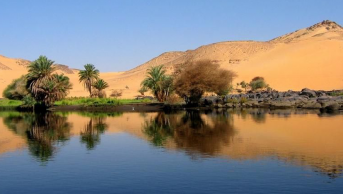Climate Change Changing Minds in the Middle East: Road towards COP21 and Beyond

Having gathered in Paris, France, leaders of 150 states, along with some 40,000 delegates from nearly 200 countries, are discussing at the United Nations Climate Change Conference (UNFCC). Negotiations will continue until December 11, with an aim of creating a legally binding document which will be put into effect starting from 2020. The Conference of the Parties 21 (the COP21), another name for the Conference, tells us that the Parties to the UN Convention have been meeting for 21 years in order to discuss the climate of the Earth. While expectations run high for a strong outcome, the Conference hitherto continues to be an arena for greatly divergent interests to face and sometimes fight or reconcile with each other. One of such divergence appears between countries that are dependent on oil sales for their wealth, and those try to reduce their fossil-fuel dependency for a livable planet.
In such a context, climate change was traditionally not a serious threat according to many oil rich Middle Eastern countries, until recently. For instance, a commentator summarized previous Saudi role in global climate negotiations as “wrench throwing” to the discussion table. That is to say, Saudis, at least in many cases, were good and brilliant enough to prevent negotiations from reaching meaningful conclusions. Indeed, the Saudi regime, the number-one oil exporter in the world, is always happier to sustain its oil sales for its economic development which stands at a fragile balance given the high rate of population increase along with the volatility in oil prices. Therefore, from a Saudi perspective, successful climate change negotiations could have meant a decline in demand for oil, which is the commodity that Saudi Arabia rests upon.
However, this trend, namely ignorance of climate change as a priority issue, has recently been shaken amid a strong wave of alteration in political economic setting in a global scale. Number one factor contributing to recent change of minds has been the sharp decline in oil prices. Saudis have discovered that they have already been affected from climate change no matter what the oil price is. Furthermore, with declining oil prices, they now lost some of their adaptive capacity. Under such circumstances, they found jumping on the climate negotiations bandwagon as a viable path. They also intensified diversification of their economy with an aim of getting prepared for post-oil scenarios and towards greener growth.
This was also reinforced by the climate-change problems that many countries Middle East have now more directly faced. To illustrate, some studies have warned that the Muslim pilgrimage, the Hajj can become a life-threatening experience due to such unprecedented changes in climatic conditions. Also, according to a study in Nature Climate Change, vast areas in the Gulf region can become uninhabitable before present century ends, due to extreme heat waves humans cannot tolerate. One of the biggest country of region, both in terms of territory and population can become a “ghost town”, according to the former Agriculture Minister of the country. These and similar scenarios certainly denote a gloomy future where the foundations of the Gulf states are in great risk. Hence, each day greater number of Middle East countries is developing deep perceptions of the dangers of the unabated continuation of fossil-fuel use. The cost of inaction has evidently exceeded the cost of implementing tough measures.
Iran, for example, is another notable case in point. With its current 650 million tons of annual CO2 emission, the country stands at the eleventh rank of top emitters globally. This figure will, at least, double in fifteen years, given the current rates of growth. Iran, being aware of the fact that the climate change is a global phenomenon, which needs contributions from all parts of the world, came to conclusion that it also have to do more for contributing to worldwide mitigation efforts.
In retrospect, Saudis, like many other Gulf states, were successfully refraining themselves from pledging binding and demanding targets. This is not the case anymore. Climate change will have dramatic effects in this part of the world, no matter how much these countries earn from oil exports. Oil revenues may only help in adaptation efforts. But, what about mitigation? Rising sea levels or first-time-in-history heat waves cannot be tackled with an “adaptation-only" approach. Oil exporting Middle East countries now try to find a middle ground where they can accommodate both their strife for economic growth, and the climatic conditions through which their people could enjoy this economic growth. They discovered that driving an SUV would not be so enjoyable -if possible- when you use it for fleeing from your own country because of the outside temperatures had become so unbearable for human race, indefinitely.






